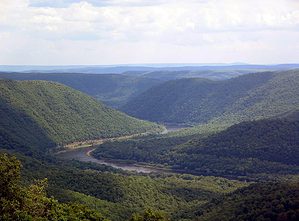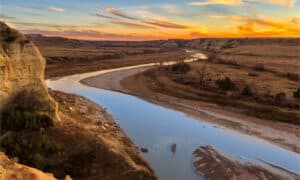Apart from being one of the largest river systems in the United States and North America, the Mississippi River is also among the most important. This is because the river has plenty of uses that help people and wildlife with convenience and basic survival. As the country’s largest drainage basin, it draws more water than any other river.
On top of that, the waterway carries huge amounts of U.S. shipments, such as grains, oil, gas, and coal. But apart from these uses, can the water in the Mississippi River also be used as drinking water? You may be aware of how polluted the river is, and that’s just the tip of the iceberg. The Mississippi River is dangerous as it is vital, but is its water safe to drink? Below, we discuss the safety of the Mississippi River’s water for drinking and other facts.
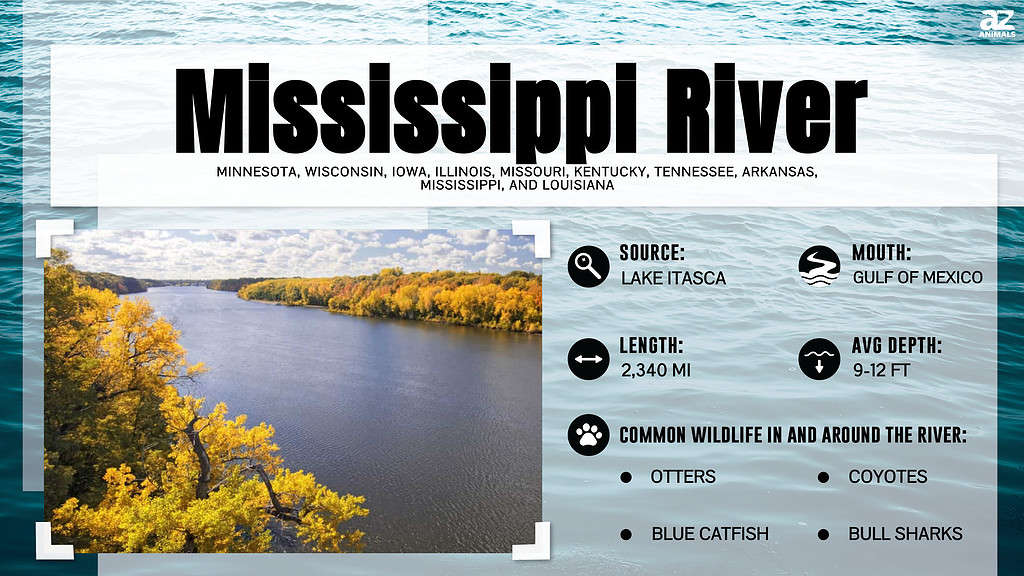
Why is the Mississippi River Important?
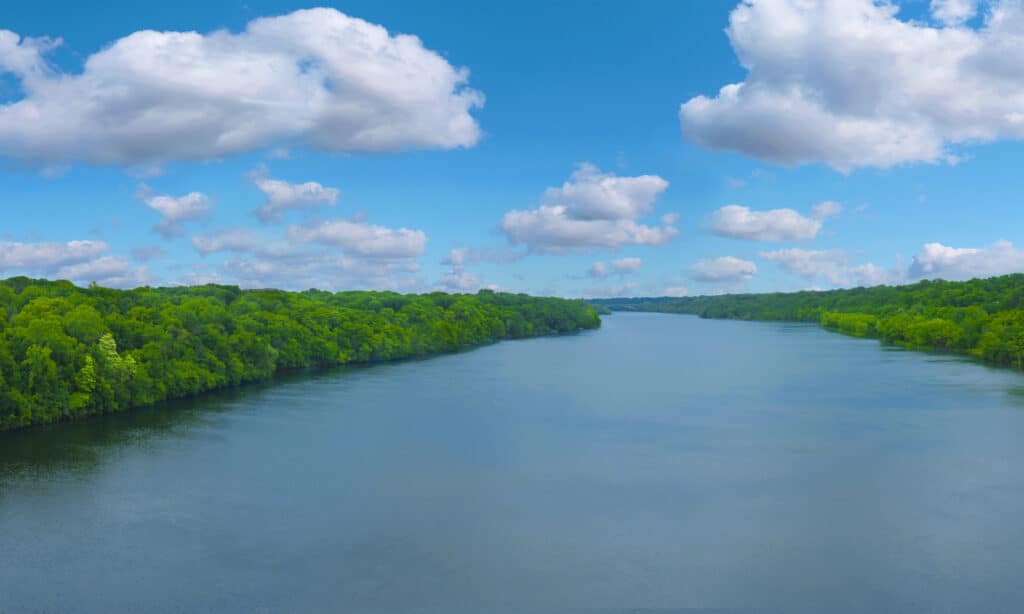
The Mississippi River also supports a 12.6-billion-dollar shipping industry that provides around 35,000 jobs to its residents.
©Milen Mkv/Shutterstock.com
The Mississippi River is by far North America’s most significant river historically. It has always been a fantastic means of exploration and transportation due to its length and the numerous states it passes through. As the country’s second-longest river, it is unsurprising that it flows through ten states: Minnesota, Wisconsin, Iowa, Illinois, Missouri, Kentucky, Tennessee, Arkansas, Mississippi, and Louisiana.
The Mississippi River serves as the common thread that weaves together all of America. It serves as the setting for numerous American stories and is a perennial source of inspiration for artists and musicians from Minneapolis to the Louisiana Delta. The river is a national cultural heritage. But it’s not all connectivity, literature, and travel.
Historical Uses
The local population has long placed a significant emphasis on the river system in their daily lives. The region was home to several different Native American tribes, who were drawn to the area’s resources, size, and proximity to the ocean. The Mississippi River helped with farming, fish collection, and trading with other people. During the American Civil War, the river system was exploited by Union soldiers as a point of invasion and the scene of numerous significant engagements.
Industry and Agriculture
Today, the Mississippi River System and its tributaries are mostly used to move commercial and agricultural goods across the whole country. Iron, steel, and mining products are some of these resources. The Mississippi River System is a significant contributor to the American economy, supplying 78% of the world’s feed grains and soybeans and 92% of the country’s agricultural exports. The Port of South Louisiana and The Port of New Orleans, two of the largest ports in the United States, also call the river home. The river also supports a 12.6-billion-dollar shipping industry that provides around 35,000 jobs to its residents. It is one of the largest waterways in the world, transporting goods and food for the entire planet.
Wildlife
Apart from all these uses to mankind, the Mississippi River also hosts thousands of animal species, ranging from freshwater fish, amphibians, and reptiles to mammals and birds. The Mississippi is home to at least 260 distinct fish species. During their spring and fall migrations, 40 percent of the migratory waterfowl in the United States travel to the Mississippi River region. On the lower Mississippi, there could be up to 60 different types of mussels. Along with at least 145 species of amphibians and reptiles, the Upper Mississippi region is home to more than 50 different mammal species.
The Mississippi River is home to diverse animals, from tiny, elusive northern shrews to larger, more noticeable species like bats, otters, beavers, coyotes, and white-tailed deer. In recent years, fish populations have also made a stunning comeback after being destroyed by extensive pollution. Many species, including eagles, otters, herons, mussels, and more, can thrive in the river due to the fish presence.
Snakes, in particular, live across the Mississippi River and are essential to maintaining the ecosystem’s equilibrium, as well as amphibians and reptiles. The northern water snake is one of the snakes found in the Mississippi River, and it can be seen in the river lurking in the underbrush and swimming alongside the bank.
Is the Water from the Mississippi River Safe to Drink?
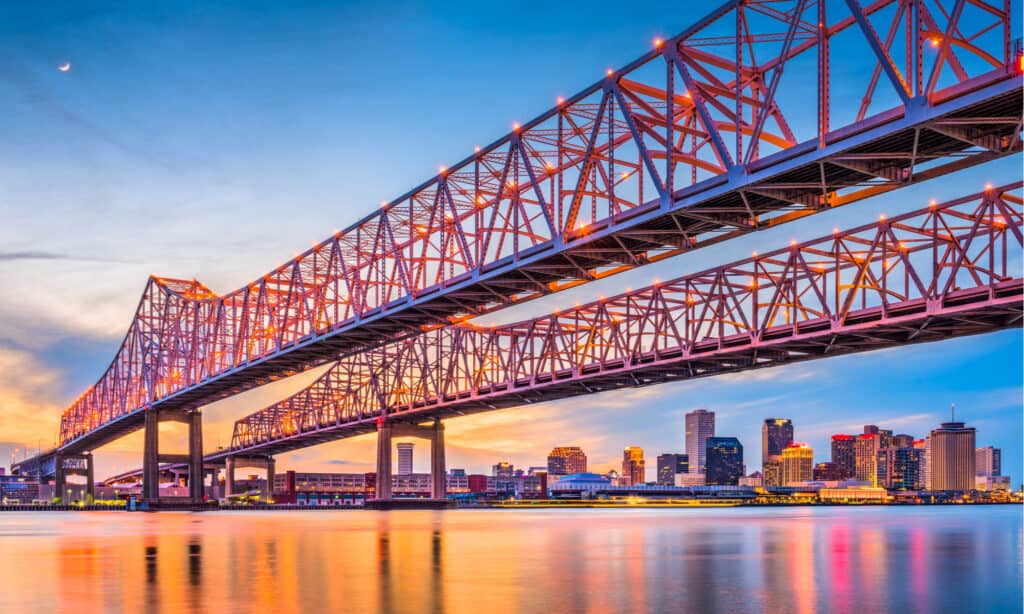
Drinking directly from the Mississippi River is very unsafe.
©Sean Pavone/Shutterstock.com
Among all the uses and purposes mentioned above, one of the most important roles of the Mississippi River’s water is to provide drinking water to residents of the country. We know what you might be thinking: but is the water from the Mississippi River safe to drink? It might be a little confusing to think that one of the most polluted rivers in the United States can also serve as drinking water, but it’s true.
The Mississippi River’s treated drinking water is actually safe and delicious, thanks to the fantastic work of public utilities. But it’s only safe to drink provided that you don’t drink straight from the river, of course. The Mississippi River provides nearly 18 million people with drinking water. The National Park Service is taking part in locating the sources of bacterial pollution in the river and creating a strategy to lessen that contamination. Communities that rely on the Mississippi River as their source of drinking water filter and purify the water for human consumption, but little is done for the fish and species that rely on the river.
Is the Mississippi River Polluted?
In addition to being the second-largest river in the country, the Mississippi River is also one of the most polluted and threatened. A pollutant in the context of rivers is anything that degrades water quality. Usually, human influence is what brings about this. This pollution is caused by various factors, including industrial operations, sewage treatment plants, and agricultural runoff.
Agricultural runoff refers to any water that escapes farmland. This water may contain pesticides, herbicides, and other potentially dangerous compounds. Sewage treatment plants are a significant source of contamination for the Mississippi River. These facilities purify human sewage before releasing it into the river. However, some raw sewage still makes its way into the river.
Although one of the main sources of pollution in the Mississippi River is agricultural runoff, there are other sources. In fact, physical pollution poses the same threat to the Mississippi River as chemical pollution. While garbage and plastic are also a worry, sediment is the main issue.
Along with daily trash, dumping has become a serious issue on the Mississippi River. Sediment buildup can occur due to trash getting into rivers and obstructing their flow. Additionally, it may leak dangerous chemicals into the water. Animals might consume some trash, like plastic rings, or get tangled in it. In some regions, all of these Mississippi River contaminants may make the river hazardous for people, plants, and animals.
Can You Swim in The Mississippi River?
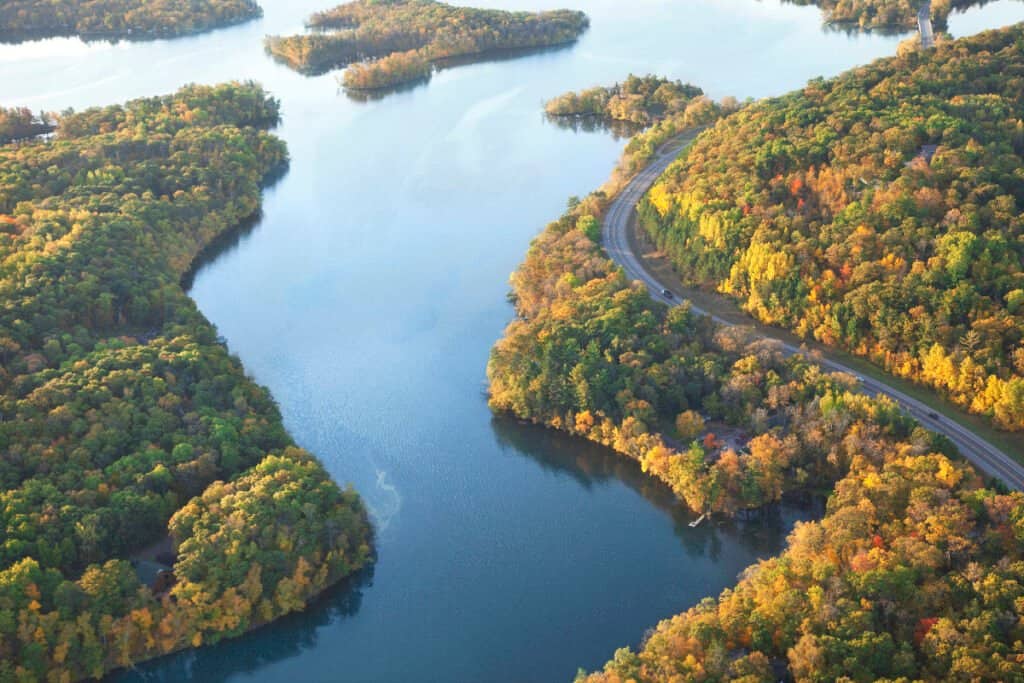
The Mississippi River has high pollution levels, so swimming there is generally not advised.
©iStock.com/Willard
You’re not the only one who may be curious about what lies beneath the murky surface of this famous American waterway. The Mississippi River has high pollution levels, so swimming there is generally not advised. However, it might be okay for a brief dip. A portion of the Mississippi River inside the park corridor has water quality limits for bacteria, silt, mercury, and PCBs that are exceeded. Sadly, these “imperfections” may render the water unsafe for swimming and fishing.
Apart from that, the inherent hazard of this river’s general flow should be enough to keep anyone out of the water. The Mississippi River could seriously hurt a swimmer, kayaker, skier, and others even while wearing life jackets. The currents could immediately throw you onto a dock, boat, tree, or other floating objects.
Undertows are another river concern. Undertows occur when riverbed friction slows currents. At the intersection of the two currents, the water forms a corkscrew pattern at the surface. The Mississippi’s water swirls violently; thus, surviving an undertow is difficult. Undertows can quickly draw a swimmer out to sea and make it difficult to return.
Can the Mississippi River be Restored?
Although the Mississippi River may never return to its original state, restoring it to quite safe levels is possible. Some of the physical pollutants in the Mississippi River, such as trash, litter, and plastic, can be removed with the aid of cleanup teams. Increased restrictions on agriculture may also be able to stop too much runoff. It is possible to start working to repair the Mississippi River and lessen the number of contaminants damaging it, albeit it might take some time.
Although the Mississippi River is among the ten most endangered rivers in the country, it is becoming cleaner. According to one study, the amount of dangerous bacteria and chemicals in the Mississippi River has reduced since the 1970s. As a result, the Mississippi River may have a better, cleaner future after all.
The photo featured at the top of this post is © Maarten Daams/Shutterstock.com
Sources
- American Rivers, Available here: https://www.americanrivers.org/river/mississippi-river/#:~:text=As%20the%20nation's%20second%2Dlongest,and%20food%20for%20the%20world
- Wikipedia, Available here: https://en.wikipedia.org/wiki/Mississippi_River_System
- 1 Mississippi, Available here: https://1mississippi.org/water-quality/
Thank you for reading! Have some feedback for us? Contact the AZ Animals editorial team.



